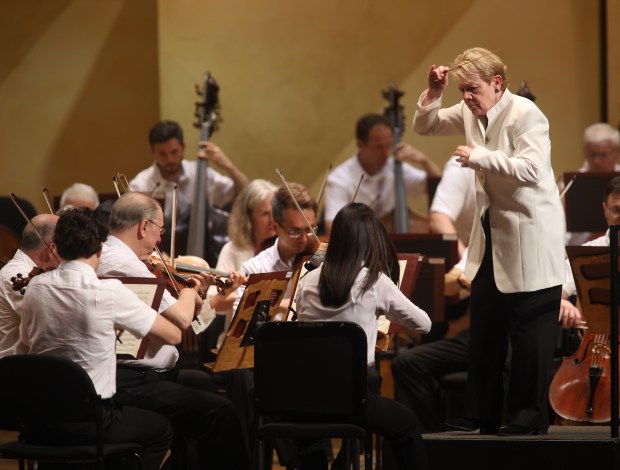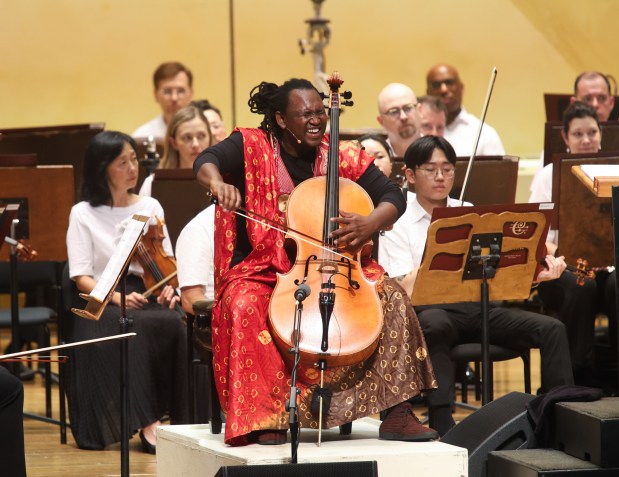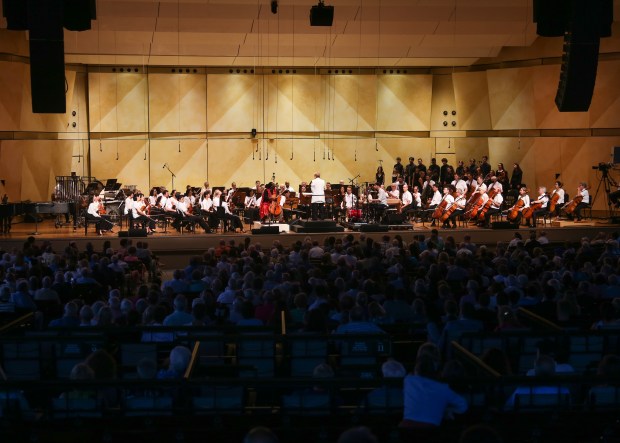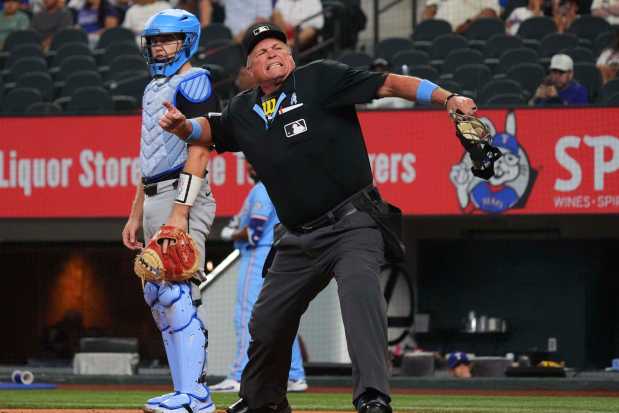In grim times such as these, an all-American program can feel as much like an elegy as a celebration.
So it was Friday, when the Chicago Symphony touched down at the Ravinia Festival, its northerly summer home, in music by Gershwin, Barber, Copland and stride piano innovator James P. Johnson. And it was inescapable by Saturday, when audience members arrived at the park grounds amid word of an apparent assassination attempt against former president Donald Trump.
Obviously, Ravinia chief conductor Marin Alsop anticipated none of this when she plotted last weekend’s concerts months ago. But her decision to book two artists from South Africa — a country that confronted the evils in itself to build a true democracy, however fragile — couldn’t have proved more timely.
The impossible task of headlining Saturday’s concert went to Abel Selaocoe (pronounced se-LAO-cho-eh). In 2022, the cellist, singer and composer released “Where Is Home (Hae Ke Kae),” a gobsmacking debut album making cozy bedfellows of Baroque suites and apartheid resistance anthems. His audience introduction made no direct mention of the evening’s news, except to describe his choral-orchestral “Four Spirits” — in a prismatic orchestration by Benjamin Woodgates — as “healing music.” Make that double.
On a night when audiences’ minds were doubtless elsewhere, Selaocoe’s captivating performance not only brought listeners to Earth but persuaded us it is still a beautiful place to be. His is joyous, participatory music, inviting audience members and CSO members alike to sing along to the Zulu verses in the hymnal final movement. (The Deerfield High School Chorus, colorful if muted on Saturday, took the majority of the vocal parts throughout.)
“Four Spirits” makes regional sonic references that also appear in “Where Is Home”: Xhosa throat singing (umngqokolo), Zulu and Xhosa click-speech and a circular bowing technique out of Lesotho (segankula), which at one point slowed the first movement’s tempo like a DJ’s disc scratches.
The piece’s four movements are linked by quasi-improvisatory cadenzas — sometimes featuring Selaocoe alone, sometimes with his colleague Bernhard Schimpelsberger in a gripping, responsive solo percussion part. Schimpelsberger and Selaocoe linked up again for the evening’s encore, flowing from a nine-cello arrangement of the sarabande from Bach’s sixth cello suite into the South African traditional “Tsohle, Tsohle.”
It’s a crying shame the CSO doesn’t repeat programs at Ravinia. Selaocoe’s performance was one of the most galvanizing collaborations with that orchestra this critic can think of.
Saturday’s program led movingly, too, with a U.S. premiere by Ukrainian composer Iryna Aleksiychuk. Commissioned by the Taki Alsop Conducting Fellowship in 2023, “Go where the wind takes you …” is, naturally, haunted by the ravages of the Russo-Ukrainian War. It begins with bleak verses by Ukrainian writer Olena Stepanenko — here piped through the sound system — over the eerie sound of a rubber mallet dragged against a tam-tam. The piece demands orchestrational and emotional subtleties tough to pull off in an outdoor concert. In the pavilion, at least, Alsop and orchestra put across the details in high definition, the desolation gradually pitching into a bombastic, muscular finish.
Friday’s program reaped more mixed rewards, though its high points were positively Himalayan. The peak was a “Rhapsody in Blue” centenary nod that both acknowledged the work’s complexities and gave American pianist Michelle Cann another shot at her weather-foiled Grant Park rendition last year.
As with last year, Cann astonished. The “Rhapsody” lives in Cann’s bones: on Friday she seemed to experiment with tempos and inflections in live-time, inviting us to share in the joy of discovery with every step. It was rather different from last year’s Grant Park interpretation but not an iota less decisive; Cann patiently grew out of the final cadenza, and her extra-articulated bass lines became a fresh throughline.
The bitter irony, of course, is that “Rhapsody in Blue” exalted Gershwin to heights off-limits to Black musicians, despite its every bar being influenced by Black music. Alsop’s answer — as it ought to be — was not to jettison the “Rhapsody” but pair it with music by Johnson, the composer of the Charleston and Gershwin’s contemporary. The CSO played that spunky, immortal tune in an orchestration by David Rimelis, introduced by a trinity of jazzy solos for trumpet (John Hagstrom), clarinet (Stephen Williamson) and trombone (Michael Mulcahy).
In a rare orchestral encore, the CSO reprised Johnson with his oompahing “Victory Stride,” featuring improv breaks for Cann, Williamson, principal bassist Alex Hanna, bass trombonist Charlie Vernon and principal trumpet Esteban Batallán.
While Selaocoe brought South Africa’s sound world to the U.S. on Saturday, on Friday his compatriot Masabane Cecilia Rangwanasha dove into Samuel Barber’s “Knoxville: Summer of 1915,” that most American of masterpieces.

Rangwanasha’s soprano is immediate and dazzling. That said, unlike the consummate Cann/Gershwin union, this wasn’t a compatible match between interpreter and piece. Rangwanasha’s timbre and delivery was brasher than desirable in Barber’s twilit, nostalgic work, and she appeared to be working through some nerves in the first half, missing an entrance early on.
Under Alsop, Rangwanasha’s orchestral backers only fleetingly embraced “Knoxville’s” sentimentality themselves. Across the weekend, Alsop’s adroit direction of contemporary works much overshadowed her standard rep, most especially a polite, cool “Appalachian Spring” suite on Friday.

Beethoven’s Fifth, ending Saturday’s program, appeared to be headed the same direction after a one-note first movement. But the second movement unlocked the rhetorical qualities essential to Beethoven’s self-referential classic — the striding melody dissipating into a whisper, squirrelly strings introducing a minor-key woodwind shanty, a coda that seemed to shrug genially.
Indeed, this epitome of capital-S Serious Music is, in fact, not all serious. Alsop sparked an ecstatic, pealing Allegro finale to smilingly hit that point home. Ending a tumultuous Saturday with a glimmer of — gasp — optimism? I’ll take it.
Hannah Edgar is a freelance critic.
The Rubin Institute for Music Criticism helps fund our classical music coverage. The Chicago Tribune maintains editorial control over assignments and content.




